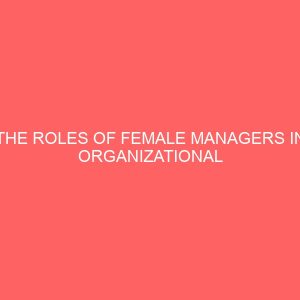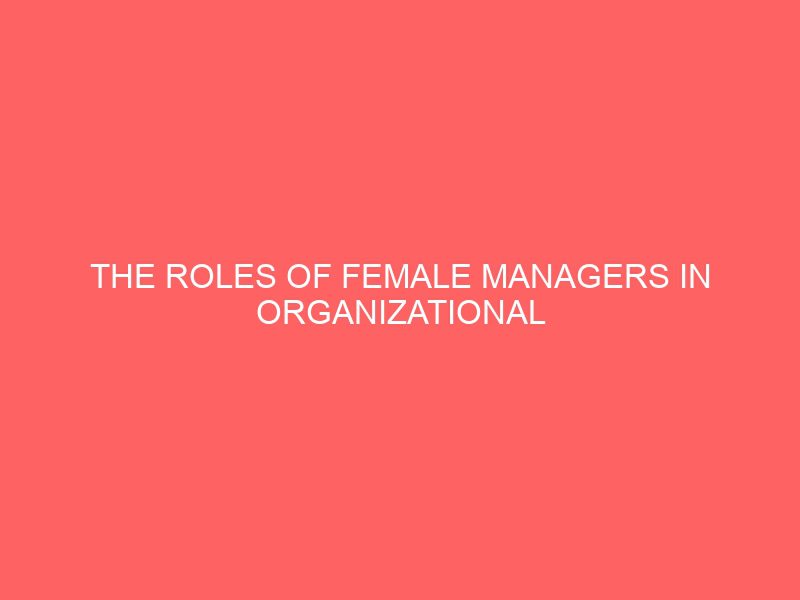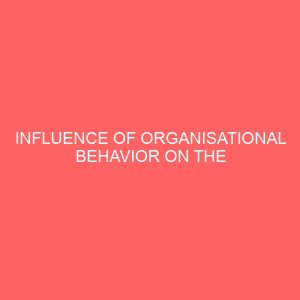Description
CHAPTER ONE INTRODUCTION 1.1 BACKGROUND OF THE STUDY Women lives have been shaped for times unrecorded by their ability to raise children, whereas men are the ones who are responsible and concerned with business and politics. Due to the societal transformation and technological developments for the last 50 years, women tried to enter to the labor market and press their role and the importance of their social activities. These changes have facilitated and confirmed that, besides being mothers and wives women are now capable to become managers, researchers, politician and many more. However there are various factors that limit women?s potential to occupy senior managerial positions. There is an argument that at the bottom of the constraints that women face is the patriarchal system where decision making powers are in the hands of males. In the African context, traditional beliefs, personal and cultural attitudes regarding the role and status of women in society are still predominant and many women as part of this system find it difficult to dislocate from this culture and tradition otherwise they could be ostracized. Despite women?s education and advancement in the job market, the woman?s role is typically one of a housewife. The man, on the other hand, is the bread winner, head of household and has the right to dominate public life. Some women were able to cross cultural barriers and rise to managerial positions, but more often than not, it meant having to manipulate cultural expectations with their managerial roles. It has been argued that women themselves are often reluctant to run for managerial positions and this is partly attributed to cultural prohibitions on women going for these positions or going to public places. Top managerial positions require travel, spend more time on work, go to different meetings and go into hotels and different public gathering places for women that meant meeting with men. Women who strive for managerial positions have to consider the risk of being labeled ?loose? or ?unfit? as mothers and wives, and being socially stigmatized. Even if they are successful with their family, their life partners will not easily accept such a situation for a long. Such thoughts make many women to decline such positions that would put them in the public eye. Although there are a lot of challenges that face women managers, there is also good progress like government initiatives in adopting different policies and issuing directives to encourage women to stay and exercise top managerial positions and even in the political arena women are given a quota to represent their community in different settings. Therefore, this paper will examine the impacts of female managers in organizational efficiency. Moreover, it will compare the technical, leadership, intrapersonal and environmental skills of female dominated organization with a male dominated one. 1.2. STATEMENT OF THE PROBLEM The concept of organizational management is psychological, it play a huge role in determining the efficiency and productivity of the organization. Women in managing organizations face a lot challenges. They would need to spend more time on work, attend different meetings and go in to hotels and public gatherings. It is against this that the researcher sees the subject matter worthy of investigation to examine if female managers contribute to organizational efficiency despite facing the problem of managing their house duties with office works. It would reveal how those challenges affect their efficiency in the managerial position. 1.3. RESEARCH QUESTIONS 1. Do you think female managers are more efficient than male managers? 2. Does female manager play a role in organizational efficiency? 3. What hurdles/ obstacles women managers face realizing their potential? 4. How women exercise their capabilities in making decision and using their discretion? 5. Do women have their own leadership style that the companies need? 6. How far the policies and strategies can support women managers? 1.4 OBJECTIVE OF THE STUDY 1. To examine government and corporate policies that hamper women from realizing their potential. 2. To understand and investigate the opportunities that women managers have in the course of managing organizations 3. To examine whether the female managers are more efficient than the male managers. 4. To examine the roles of female managers in organizational efficiency 5. To observe the specific leadership style that women are using in their work place and to determine its effectiveness. 1.5. SIGNIFICANCE OF THE STUDY Although there are different initiatives and programs that are considered as opportunities for women to raise up to top managerial posts there are still insignificant number of women in top managerial positions in different corporate organizations. This study would help to find out why those initiatives have not worked as expected. More so, this study would help organizations in knowing the roles of female managers in organizational efficiency as well as stating whether female managers are more efficient than the male managers. 1.6 SCOPE OF THE STUDY The research was limited to senior managers in the selected organization which is an organization dominated by female and male. Therefore it may not represent the current situation of women managers in the whole of Nigeria. The result gives insight in the impacts of female managers in organizational efficiency, challenges and opportunities that woman in senior managerial position face. For this reason, the Nigeria Bottling Company, Ibadan was selected as the case study of the research work. 1.7 LIMITATION OF THE STUDY 1. Network interconnectivity to enhance elaborate research ? 2. High level of illiteracy 3. Organization operational huddles. 4. Time and cost constraints due to cause of scarcity in gasoline to go about the research.







